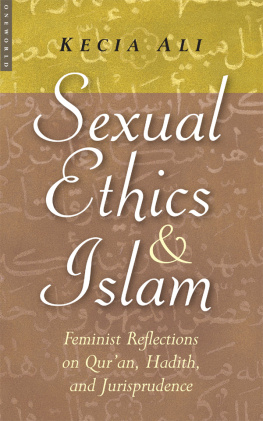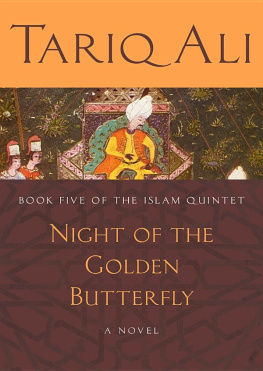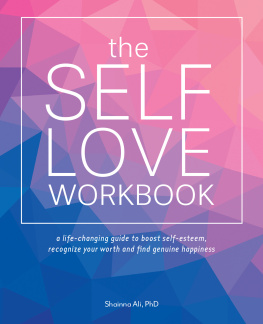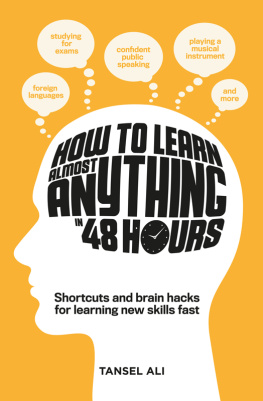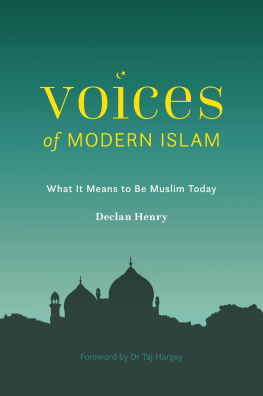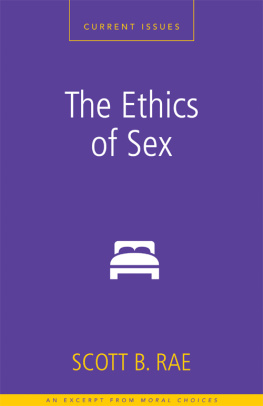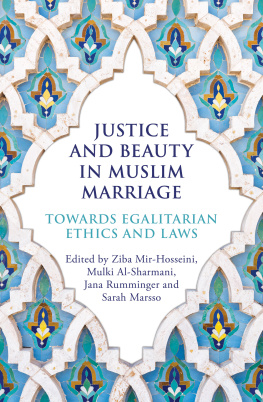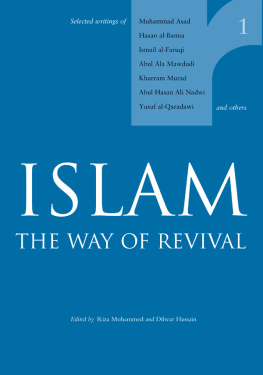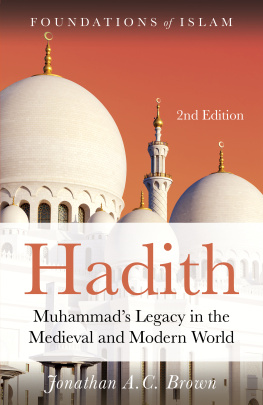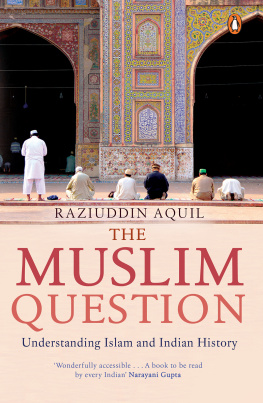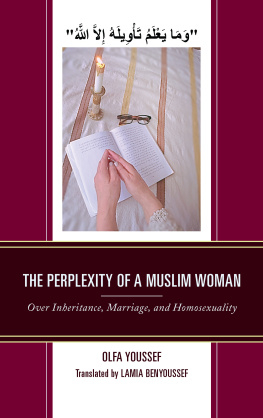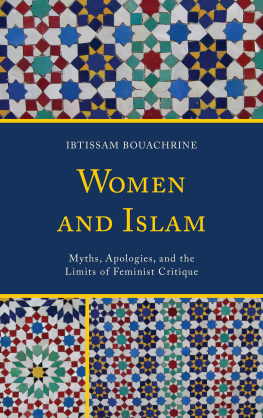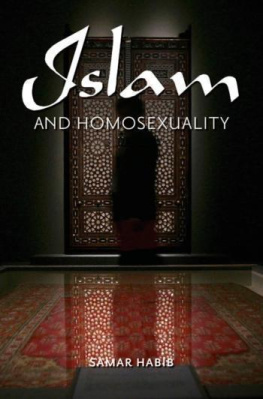SEXUAL ETHICS AND ISLAM
Sexual Ethics and Islam
Feminist Reflections on Quran, Hadith, and Jurisprudence
K. Ali

SEXUAL ETHICS AND ISLAM
Published by Oneworld Publications 2006
Reprinted 2008, 2010
This ebook edition published by
Oneworld Publications 2011
Copyright K. Ali, 2006
All rights reserved.
Copyright under Berne Convention.
A CIP record for this title is available from the British Library
ISBN: 9781780740355
Cover design by Design Deluxe
Typeset by Jayvee, Trivandrum, India
Oneworld Publications
185 Banbury Road
Oxford OX2 7AR
England
Learn more about Oneworld. Join our mailing list to find out about our latest titles and special offers at:
www.oneworld-publications.com/newsletter.htm
For my mother, my first instructor in ethics,
and for my children; may their instructor prove as capable.
Study of the tradition demands an exercise of the historical imagination that is sympathetic as well as critical; sometimes what is branded as obscurantism or bigotry is simply a reflection of a climate of ideas wholly alien from that of our own time. Some of the sexual notions transmitted to us from the past are unfounded, and their effect has proved to be damaging; but while we may deplore this, we must also make the effort to understand where they originated and why they were accepted and to realize that their advocates were rarely moved by malevolence or stupidity.
Sherwin Bailey, Sexual Ethics: A Christian View
Acknowledgements
This book advocates, among other things, assessing customary practices and, rather than implementing them unquestioningly, modifying them as necessary. It seems fitting, then, that as I uphold the tradition of acknowledging the numerous debts accrued in writing this volume, I alter it in one important respect: I wish to thank my family first, rather than last. My husband Mohamad Ali has been extraordinarily supportive over the years I have worked on this project. Our children Shaira, Saadia, and Tariq continue to inspire me with their insistence on asking why when confronted with unfairness and injustice as well as their unwillingness to accept unconvincing answers. The confidence and encouragement from members of our extended family have sustained me over the years. They all have my gratitude as well as my love.
This project has its roots in my work during 20012003 with the Feminist Sexual Ethics Project, funded by the Ford Foundation and led by Bernadette Brooten. The first versions of several of these essays, published on its website, took shape as I worked alongside Gail Labovitz, Monique Moultrie, Raja El-Habti, and Molly Lanzarotta. I collected additional material during 20032004, while working on another project as a research associate at Harvards Womens Studies in Religion Program. My colleagues at WSRP were enthusiastic; Sharon Gillerman in particular helped by translating crucial portions of an article for me on short notice. The bulk of this book was written during my time as a Florence Levy Kay postdoctoral fellow at Brandeis University. A number of its ideas were first presented and discussed in public lectures and conferences at the American Academy of Religion annual meetings, Brandeis University, Boston University, Brown University, Clemson University, Duke University, New York University, and Princeton University.
It would be impossible to name all the individuals with whom Ive enjoyed conversing and debating over the topics in this book, but a few cannot escape mention. Ebrahim Moosa and Bruce Lawrence at Duke University were particularly helpful, as was miriam cooke, who read a complete draft of the manuscript and made many helpful suggestions. Farid Esack, Jamillah Karim, Kevin Reinhart, Omid Safi, Sadiyya Shaikh, Laury Silvers, Harvey Stark, and Amina Wadud asked perceptive questions and prompted me to clarify certain points and expand on others. Zahra Ayubi, Ariel Berman, Ayesha Siddiqua Chaudhry, Aysha Hidayatullah, Scott Kugle (who also helped with translation in a pinch), Rusmir Music, and Audrey Shore commented on chapter drafts. Anjum Ansari, Afshan Bokhari, Sepi Gilani, and Mara Worle, as well as their respective husbands Bil Ragan, Scott Chisholm, Alex Norbash, and Amr Ragy, have been part of numerous dinner conversations on the topics of this volume. Needless to say, they did not always agree with me, or each other, but their astute comments and sharp observations have made this a better book than it otherwise would be. I owe Mara special thanks for her comments on drafts of . Though I have appreciated the advice of all of these individuals, I have not always taken it, and none of them is in any way responsible for any errors of fact or interpretation that remain.
Finally, I would like to thank Hend al-Mansour for granting permission to use her painting on the cover. It contains text drawn from Surat Yusuf, the chapter of the Quran that tells the story of the attempted seduction of the Prophet Joseph by his masters wife, traditionally known as Zulaykha. This best of stories includes passionate female desire, attempted sexual coercion, and divinely ordained standards of intimate conduct for men and women. It seemed particularly apt as an image: Muslim women are rereading and reimagining the Quran, in dialogue and in tension with previous approaches but still bound by certain constraints of the text itself.
Note on texts, translation, and transliteration
Because the specific Arabic terminology and its connotations are so vital to the issues at stake, particularly where the words have legal implications, I have striven for consistency in my translation of key terms. Where I had to choose between a literal-but-awkward rendering or a more idiomatic but less precise rendering, I have generally chosen the former. Unless otherwise noted, translations of works cited in Arabic are mine and works cited in English translation are by the translator. However, because of the nuances of the terms at stake, I have often chosen to retranslate passages from Arabic text included in a parallel English/Arabic edition of a particular text. I have made clear in the Notes where I have done so.
Where I have quoted hadith works and legal texts, I have provided the titles of chapter and subsection in addition to volume and page number for the editions cited in the Bibliography, so that those working with other editions of the texts can more easily locate the relevant passages. In the case of the Sahihs of Bukhari and Muslim, I have usually chosen to cite the English or English/Arabic editions for ease of reference.
I have generally followed the IJMES system for transliteration but, for the sake of simplicity, I do not use diacritical marks with the exception of for medial hamza and for ayn. Those familiar with Arabic should not have difficulty recognizing the terms used.
Introduction
For the vast majority of Muslims world-wide not only extremists or conservatives, but also those who consider themselves moderate or progressive determining whether a particular belief or practice is acceptable largely hinges on deciding whether or not it is legitimately Islamic. Even many of those who do not base their personal conduct or ideals on normative Islam believe, as a matter of strategy, that in order for social changes to achieve wide acceptance among Muslims they must be convincingly presented as compatible with Islam. This focus on Islamic authenticity is particularly intense on matters relating to women, gender, and the family, where complex issues are often reduced to fodder for charged debates over womens status in Islam. The so-called woman question is central to both anti-Muslim polemic and the apologetic counter-discourse that adopts a terminology of liberation to describe the way true or real Islam respects and protects women, despite the existence of potentially oppressive cultural practices. The limitations of these dichotomous approaches are evident, and a rich and growing body of scholarship by Muslim women and men seeks to deepen and complicate discussions of issues relevant to womens lives as well as our understanding of the layered and intertwined nature of dominant discourses.

